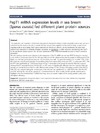Please use this identifier to cite or link to this item:
https://accedacris.ulpgc.es/jspui/handle/10553/10065
| Title: | PepT1 mRNA expression levels in sea bream (Sparus aurata) fed different plant protein sources | Authors: | Terova, Genciana Robaina, L. Izquierdo, Marisol Cattaneo, Annagiulia Molinari, Silvia Bernardini, Giovanni Saroglia, M. |
UNESCO Clasification: | 251092 Acuicultura marina | Keywords: | Oligopeptide transporter PepT1 Gene expression Real-time PCR Fish meal substitution Vegetableingredients, et al |
Issue Date: | 2013 | Journal: | SpringerPlus | Abstract: | The expression and regulation of intestinal oligopeptide transporter (PepT)-1 when vegetable sources are used as a\nsubstitute for fish meal in the diet of marine fish has not yet been explored. In the present study, as part of our\nongoing work on elucidating PepT1 gene expression in relation to different dietary treatments, we have now\nisolated and deposited in Genbank database (accession no. GU733710) a cDNA sequence representing the PepT1\nin the sea bream (Sparus aurata). The ?de novo? prediction of the three-dimensional structure of PepT1 protein is\npresented.\nWe also analyzed diet-induced changes in the expression of PepT1 mRNA via real-time RT-PCR using the standard\ncurve method. Sea bream were fed for 140 days with one of the following four diet formulations (43% protein/21%\nlipid): a control fast growth-promoting diet (C), and three diets with the same formulation but in which 15% of the\nfish meal was substituted by protein concentrates either from lupine (LPC), chick pea (CPC), or green pea (PPC). Fish\nfed PPC had significantly (p < 0.05) lower levels of PepT1 transcripts in the proximal intestine than the controls,\nwhereas PepT1 transcript levels in fish fed LPC or CPC were not significantly different from the controls. Although\ngrowth was similar between fish fed with different diets during the first 72 days of feeding, growth of the fish fed\nwith PPC was reduced during the second part of the trial and was significantly (p < 0.05) lower than fish fed LPC\nand CPC diets by the end of the experiment. Correlation between these results and fish growth performances\nhighlights that the intestinal PepT1 mRNA level may serve as a useful marker of the dietary protein quality and\nabsorption efficiency. | URI: | https://accedacris.ulpgc.es/handle/10553/10065 | ISSN: | 2193-1801 | DOI: | 10.1186/2193-1801-2-17 | Source: | SpringerPlus [ISSN 2193-1801], v. 2 (17), p. 1-14, (Enero 2013) | Rights: | by-nc-nd |
| Appears in Collections: | Artículos |
SCOPUSTM
Citations
49
checked on Jun 8, 2025
WEB OF SCIENCETM
Citations
49
checked on Feb 15, 2026
Page view(s)
176
checked on Nov 1, 2024
Download(s)
200
checked on Nov 1, 2024
Google ScholarTM
Check
Altmetric
Share
Export metadata
Items in accedaCRIS are protected by copyright, with all rights reserved, unless otherwise indicated.
